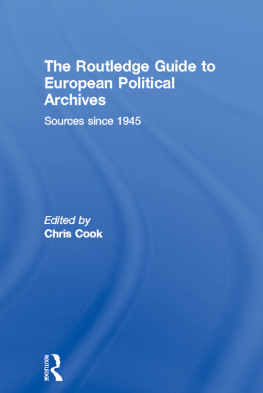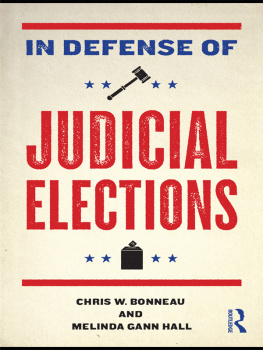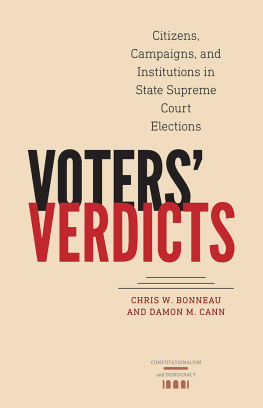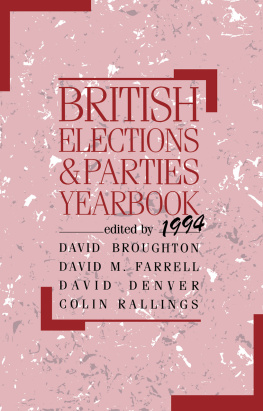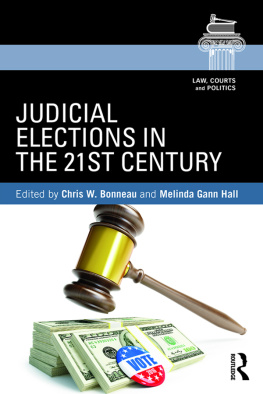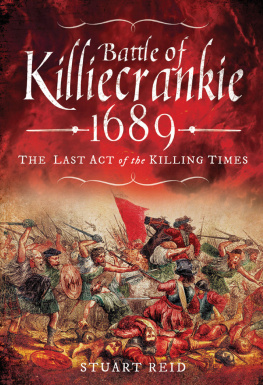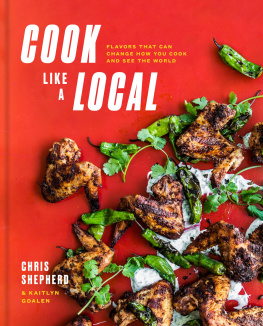A History of British Elections Since 1689
A History of British Elections Since 1689 represents a unique single-volume authoritative reference guide to British elections and electoral systems from the Glorious Revolution to the present day.
The main focus is on general elections and associated by-elections, but Chris Cook and John Stevenson also cover national referenda, European Parliament elections, municipal elections, and elections to the Welsh and Northern Irish Assemblies and the Scottish Parliament. The outcome and political significance of all these elections are looked at in detail, but the authors also discuss broader themes and debates in British electoral history, for example: the evolution of the electoral system, parliamentary reform, womens suffrage, constituency size and numbers, elimination of corrupt practices, and other important topics. The book also follows the fortunes not only of the major political parties but of fringe movements of the extreme right and left.
Combining data, summary and analysis with thematic overviews and chronological outlines, this new reference work provides a definitive guide to the long and varied history of British elections and is essential reading for students of British political history.
Chris Cook is a Visiting Fellow at the London School of Economics. His publications include By-Elections in British Politics with John Ramsden (1973), A Dictionary of Historical Terms (1998) and, more recently, The Routledge Guide to British Political Archives (2006), The Slump: Society and Politics in the Depression with John Stevenson (2009) and The Routledge Guide to European Political Archives (2012).
John Stevenson was formerly Reader in Modern History at Worcester College, Oxford. His publications include The Routledge Companion to Britain in the Eighteenth Century with Jeremy Gregory (2007) and he has most recently edited the final volume of the English Historical Documents series, covering the years 19141957 (forthcoming).
First published 2014
by Routledge
2 Park Square, Milton Park, Abingdon, Oxon OX14 4RN
Simultaneously published in the USA and Canada
by Routledge
711 Third Avenue, New York, NY 10017
Routledge is an imprint of the Taylor & Francis Group, an informa business
2014 Chris Cook and John Stevenson
The right of Chris Cook and John Stevenson to be identified as authors of this work has been asserted by them in accordance with sections 77 and 78 of the Copyright, Designs and Patents Act 1988.
All rights reserved. No part of this book may be reprinted or reproduced or utilised in any form or by any electronic, mechanical, or other means, now known or hereafter invented, including photocopying and recording, or in any information storage or retrieval system, without permission in writing from the publishers.
Trademark notice: Product or corporate names may be trademarks or registered trademarks, and are used only for identification and explanation without intent to infringe.
British Library Cataloguing in Publication Data
A catalogue record for this book is available from the British Library
Library of Congress Cataloging in Publication Data
Cook, Chris, 1945
A history of British elections since 1689 / Chris Cook, John Stevenson.
pages cm
Summary: Combines data tables, summary and analysis with thematic overviews and chronological outlines to provide a guide to British elections and electoral systems from 1689 to 2013-- Provided by publisher.
Includes bibliographical references and index.
1. Elections--Great Britain--History. 2. Great Britain--Politics and government . I. Stevenson, John, 1946 II. Title.
JN945.C57 2014
324.941009--dc23
2014004322
ISBN: 978-0-415-52178-9 (hbk)
ISBN: 978-1-315-77728-3 (ebk)
Typeset in Times New Roman
by Saxon Graphics Ltd, Derby
Contents
It would be impossible for anyone to write on British electoral history without acknowledging a major and pervasive debt to Sir David Butler, the doyen of British psephologists. Both authors have been privileged to know him since their time at Nuffield College and their debt remains very high. Nuffield is still very much the spiritual home of this book.
At the London School of Economics Library, thanks are due to the Librarian, Liz Chapman, and the many library staff who have helped generously on specific enquiries, especially Ben Martill and Nick White. Among other friends and colleagues who have offered help, advice and encouragement (probably unwittingly) are Roger Beeson, James Robinson and Adrian Webb. Harry Harmer provided great assistance in the compilation of the Glossary, whilst Linda Hollingworth keyed in much of the manuscript.
A different sort of debt is due to those who have laboured to produce the definitive reference works on electoral statistics and voting behaviour, whose rich seams have been frequently mined for this volume. Among those that have been of enormous value for this book are Colin Rallings and Michael Thrasher, British Electoral Facts, 18322012 (2012), David Butler, Twentieth Century British Political Facts, 19002000 (2000) and the later British Political Facts since 1979 (2006). For successive elections since 1945 the Nuffield Election Studies have been invaluable.
Finally, both authors would urge those who find any errors or omissions in this book to alert us so that changes can be made in future updated and expanded editions of this publication.
Chris Cook
John Stevenson
31 March 2014
1 Parliamentary representation before 1832, England and Wales.
2 The Reform Act 1832, England and Wales.
3 Parliamentary constituencies, 16041800, Ireland.
4 Parliamentary constituencies, 180185, Ireland.
5 Parliamentary constituencies, 1885, Ireland.
Britain now has more elections than at any time in its history. Whilst general elections (and the by-elections held to fill vacancies in the House of Commons) have long been part of the political process, other tests of the wishes of the electorate have now also become part of that system. Thus, for example, the use of the referendum to test the national will (or the will of parts of the UK) has been seen over membership of the European Community (1975), devolution for Scotland and Wales (1997), electoral reform (2011) and Scottish independence (2014). Also in recent years electors in parts of the country have been able to vote for directly elected mayors and (in November 2012) for Police and Crime Commissioners (an exercise in democracy greeted with quite extraordinary apathy).
But the road to this plethora of elections has been a slow one. Even the advent of an electoral system enshrining the principle of one person one vote has been an extremely protracted and bitter process. Prior to 1832 (when the first tiny step towards a slightly more representative franchise was made) only one person in 20 of the adult population possessed the franchise. This increased marginally to 7 per cent in 1832 and to 16 per cent after 1867, with much larger increases in 1885. Only in 1918 did adult male suffrage for those aged 21 or over become a reality. Women fared less well: only those aged over 30 receiving the vote. Their equality had to wait until 1928. Moreover, even after 1918, some individuals had more than one vote due to the business vote and university franchises. Even after 1928 various caveats need to be made. The vote was not extended to those aged 18 or over until 1969. And the question of votes for the 16+ age group remains unresolved. Moreover, many thousands of people are not entered onto the register for whatever reason and hence are totally disenfranchised.







